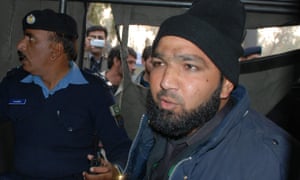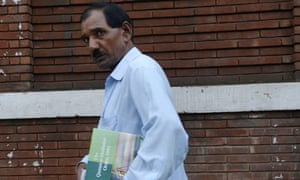Asia Bibi blasphemy case to be heard by Pakistan supreme court

Christian woman sentenced to death in 2010 after allegedly insulting the prophet Muhammad during village argument

The most notorious cases involving Pakistans blasphemy laws will be heard by the countrys supreme court on Thursday in a legal showdown that lawyers hope will spare the life of a poor Christian woman and curb future convictions.
Asia Bibi was sentenced to death in 2010 for allegedly insulting the prophet Muhammad following a bad-tempered argument with Muslim women in Itanwali, the small village in Punjab where she used to live.
She became a touchstone for liberals and Islamists alike after her case was linked to the assassination in January 2011 of Salmaan Taseer, then governor of Punjab.
He was shot in the back by Mumtaz Qadri, one of his own police bodyguards, who had been outraged by Taseers public support for Bibi. Taseer had lobbied for a presidential pardon for her and publicly denounced the blasphemy legislation as a black law.
He echoed criticism of human rights groups which say laws intended to protect Islam have been widely abused, with false or flimsy allegations often levelled against religious minorities as an excuse to settle property disputes.
While liberal activists have called for Bibis release, Islamist hardliners have demanded her execution, not least during vast demonstrations that erupted in Rawalpindi in March after Qadri was hanged for Taseers murder.

Bibis husband, Ashiq Masih, told the Guardian the family has been in hiding ever since Qadris execution.
If Asia is acquitted we will never be able to return to our previous life, as my wife has been labelled an infidel and an infidel doesnt deserve to survive in a society full of hatred, he said. Too many want her dead and have put a bounty on her head.
Asad Jamal, a leading human rights lawyer, said the court had no option but to acquit Bibi. Both her original trial and her first appeal in the Lahore high court in 2014, which upheld her conviction, were hopelessly flawed, he said.
There is absolutely no case against Asia, I really cant emphasise that enough, he said. It should take no more than 30 minutes to throw the case out.
Bibi was accused of insulting Islams holiest figure after rowing with Muslim women from her village with whom she had been harvesting falsa berries. The argument broke out after the other women refused to take water from the same cup as a Christian.
Bibi was convicted despite the fact that it took five days for a criminal complaint to be lodged against her and that her accusers held grudges against her. Some evidence given by different witnesses in the trial was contradictory.
A relative who did not wish to be named said the family had been continually victimised by Muslim villagers.
There were fights, scuffles and arguments almost on daily basis, he said. Sometimes on drainage problems and water pipelines. They were always in search of something to fight with our poor family.
Although most blasphemy cases suffer from weak evidence, many police officers and judges are unwilling to put themselves at risk by throwing out the case.
In 1997 a retired high court judge who acquitted two Christians of blasphemy charges was murdered in his office. In 2014 a lawyer was shot dead in the city of Multan after agreeing to defend a man charged with blasphemy.

An acquittal of Bibi by the countrys top judges would be legally momentous.
According to Jamal, it is the first time the supreme court has heard a case under section 295-C of the countrys basic criminal law, which bans insults of the prophet Muhammad.
He said if the court ruled that the prosecution failed to meet the prescribed Islamic method of testing the truthfulness of witnesses which are so tough as to be practically impossible to achieve then blasphemy cases would dwindle.
Every trial court will have to see whether the evidence comes up to the Islamic standard. The conviction rate will go down many fold, he said. Ultimately it could contribute to the eventual abolition of these laws.
It remains to be seen how far the supreme court will go. It has already angered the religious right by upholding Qadris death sentence and ruling that criticism of the blasphemy laws did not itself constitute blasphemy.
Bibis husband said the court was the last ray of hope for me, my children and family members.
He added: We know if she is acquitted there will be outrage, but at least it will stop the trend for more convictions under the blasphemy law.
He said the seven years spent behind bars had taken a heavy toll on his wife, mentally and physically. She is held in solitary confinement for her own safety and has no access to reading material.
There were 434 blasphemy cases registered between 1953 and 2012, according to the Legal Aid Society.
A network of lawyers who offer their services for free to people lodging blasphemy cases has helped drive up the number of cases in recent years, with 336 filed in Punjab province alone in 2014.
Although the state has never carried out a death sentence for blasphemy, at least five people accused of blasphemy have reportedly died in custody.